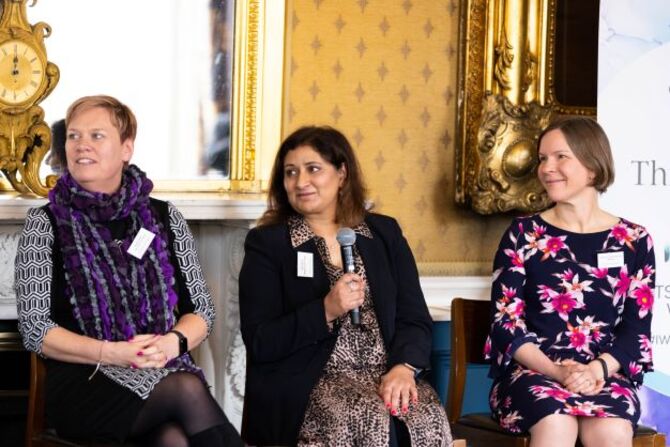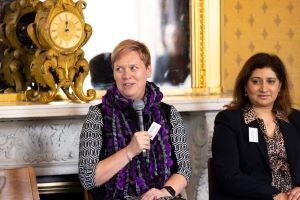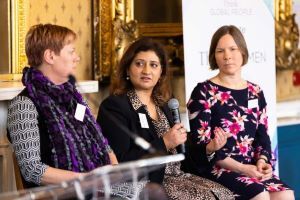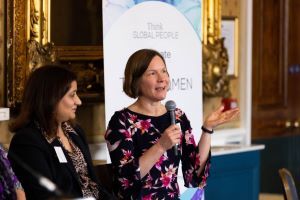The challenges and opportunities in creating a diverse workforce
Creating a diverse workforce means opening up opportunities for all, rethinking overseas assignments, getting the right support and package in place and not looking at women as a single homogenous group.

Related reading from Relocate Global
- Changing the dial on womens leadership
- Key takeaways from the Think Women celebration of International Women’s Day
- Think Women's 40 Outstanding Global Women
- Think Women Podcast - Fiona Murchie and Marianne Curphey
Watch the video highlights
Caroline Thorley-Farrer described how her first experience of global mobility was in her early 20s.“I put myself on a train at age 21 and went to Brussels where I didn't know anyone,” she explains. “Then, when I came back to the UK I took a big risk moving from expatriate tax to global mobility. I had to take a step back and work my way back up.”Years later, she moved with her family to Singapore, and found that as the non-working spouse, it was difficult for her husband to organise utilities, school and housing issues.“I pushed myself into taking risks in an international career, and I made it work for us as a family,” she said. In her current role, diversity is at the top of her agenda, but she acknowledged that sending women to long-term hardship locations was a challenge.




Taking risks and making connections
In the workshop that followed, the discussion centered around the importance of having confidence, taking risks and making connections.The round table discussions agreed that it was vey important to share stories of women who have great experiences and faced great challenges and how they have overcome them. International experience was seen as important to confidence and career development, and that it developed you as a person. You become less judgemental if you travel, and you learn stories and experiences from other countries and cultures.Some of the potential barriers were lack of self-confidence, fear of the unknown, a lack of knowledge on how to navigate the world overseas and an unwillingness to take a risk. Some of this could be mitigated by cultural awareness and training and support with languages.The groups agreed that young women could benefit greatly from internal assignments when they were in their 20s and in the early stages of their career, before the had the responsibilities of childcare.Caroline Boyle, VP of Customer product at Alto Vita, said international experience builds confidence, grow awareness of your own culture and empathy for other cultures and broadens your horizons.“With gender equality and diversity, it's important to have those seats at the table. When leaders make decisions that will affect everybody, you need to have representation,” she said.Gill Gordon, chair of the Permits Foundation, a not for profit organisation that tries to persuade governments to relax the work permit requirements for partners of mobile employees, said the key message of the day had been the importance of global mobility.“The experience that international mobility brings, the advantages of going out and meeting completely new people in a completely different environment, and how it stretches you and challenges you,” she said.In terms of moving the dial on equity, she said that change would not happen without effort.“We've come a long way since the 1980s, but we still quite a quite a long way to go,” she said. “It is a question of companies keeping a focus on it because it is not something that will happen by itself. Companies have to keep succession plans for women, so they can develop, and they have to keep a very close eye on equity in terms of women's salaries.”In terms of leadership, she spelt out the important qualities needed in today’s world for someone who heads up an organisation.“It's extremely important that the leader has a vision for the kind of workplace they want and leads by example, promotes talent, gives a fair chance to up and coming talent, and really tries to stretch people and look for potential and tries to develop that,” she said. “The success of a good leader is how well they manage to create a team of people and develop that team to its maximum potential.”Gina Lodge, CEO and founder of World View, a mentoring and coaching company, said the key quality of a leader was kindness.“I think a lot of people would think that it is about strategy and knowing your subject,” she said. “I would say it is actually about kindness. Kindness is just such a gift when you're working with people, because you're relating to them as human beings, not cogs in a wheel. That's really important. How you how you lead, setting the direction for people not then standing over their shoulder to see how they're doing it or checking in on them, is important too.“Trust is high on the agenda and also collaboration and, and praise. A lot of people think about end of term type reviews but if you are working together as a team, then good leadership is knowing your team, setting the direction and then letting them do what their expertise will do best. In terms of equality, we should make good use of all the skills that men and women and different personality types bring to the table.”Read more about Think Women and International Women's Day
Watch the video highlights
Sign up now at events@relocatemagazine.com to find out more about the Think Women network
Subscribe now to Think Global People magazine and read more from Marianne Curphey on women leaders and Ruth Holmes on the talent agenda for 2023 in the brand-new winter issue
©2025 Re:locate magazine, published by Profile Locations, Spray Hill, Hastings Road, Lamberhurst, Kent TN3 8JB. All rights reserved. This publication (or any part thereof) may not be reproduced in any form without the prior written permission of Profile Locations. Profile Locations accepts no liability for the accuracy of the contents or any opinions expressed herein.






































